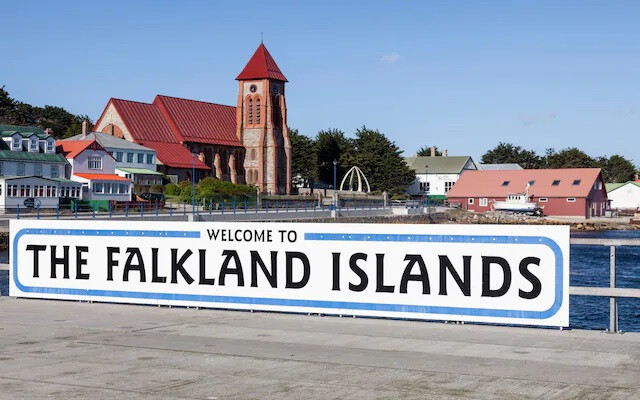
BUENOS AIRES, Argentina – The Argentine Ministry of Foreign Affairs issued a statement on May 26th, welcoming the agreement between the government of the United Kingdom and the Republic of Mauritius regarding the Chagos Archipelago. Argentina specifically noted the inclusion of Diego Garcia island in this agreement, interpreting it as a potential path to resuming dialogue for the resolution of the Falkland Islands (Malvinas Islands) issue.
Significance of the Chagos Agreement: A Major Step Towards Decolonization
Argentina described this international treaty as "legally binding and signifying the United Kingdom's recognition of Mauritius's sovereignty over the entire Chagos Archipelago and the territorial integrity of Mauritius." The ministry emphasized that this is a "decisive step" in concluding Mauritius's decolonization process, in accordance with relevant United Nations (UN) General Assembly resolutions.
The Chagos Archipelago, located in the central Indian Ocean, consists of six islands, the largest of which is Diego Garcia. In 1965, just before Mauritius gained independence, the UK separated the Chagos Archipelago and designated it the 'British Indian Ocean Territory (BIOT).' Subsequently, in 1966, the UK entered a secret agreement with the United States, allowing the construction of a US military base on Diego Garcia. This base has since served as a critical strategic hub for US operations in the Middle East and Afghanistan. During this process, approximately 2,000 native Chagos islanders were forcibly displaced, drawing international criticism.
Mauritius has long asserted its sovereignty over the Chagos Archipelago. In 2019, the UN International Court of Justice (ICJ) issued an advisory opinion stating that the UK's administration of the Chagos Archipelago was unlawful. The UN General Assembly also adopted a resolution urging the immediate return of Chagos to Mauritius, increasing international pressure. The recent agreement between the UK and Mauritius is reportedly a response to these international demands. It includes provisions for the UK to transfer sovereignty over the Chagos Archipelago to Mauritius while retaining the right to operate the military base on Diego Garcia for at least 99 years. This marks a significant diplomatic resolution after a long-standing dispute.
Precedent for Resolving the Falklands Issue
Argentina praised the Chagos Agreement as "a result reached through a process of bilateral negotiation based on mutual respect, adhering to international law and the principles of peaceful dispute resolution." It further hailed it as a "historically significant event in the decolonization process." Against this backdrop, Argentina reiterated its call for the UK to resume negotiations on the sovereignty of the Falkland Islands (Malvinas Islands), South Georgia and South Sandwich Islands, and the surrounding maritime areas.
Argentina's assertion is based on the principles outlined in UN General Assembly Resolution 2065 (XX) and other relevant resolutions. Adopted in 1965, Resolution 2065 (XX) characterized the Falkland Islands dispute as a colonial issue and recommended that both the UK and Argentina resolve the dispute through dialogue and negotiation by peaceful means. Argentina views this resolution as a diplomatic victory for its 'Malvinas' cause and a crucial moment in the international recognition of the issue as a territorial dispute.
The Argentine Foreign Ministry emphasized that "the full restoration of the exercise of sovereignty over the mentioned territories and maritime spaces remains an unchanging objective of Argentina's foreign policy." It added that the agreement between the UK and Mauritius is "an example demonstrating that it is possible to resolve disputes of this nature by peaceful means." This indicates Argentina's strong advocacy for an international precedent to resolve the Falklands issue.
Argentina reaffirmed its "willingness to engage in a serious and substantive dialogue with the United Kingdom to find a definitive solution to the Malvinas Islands issue in accordance with international law." This reflects Argentina's strong desire to ease the long-standing tensions in bilateral relations since the Falklands War and to end the prolonged territorial dispute through a diplomatic solution.
History of the Falklands Dispute and Argentina's Position
The Falkland Islands are an archipelago located in the South Atlantic, over which the UK has exercised de facto control since 1833. However, Argentina claims sovereignty over the Falkland Islands (Malvinas Islands) based on the 'Uti Possidetis' principle, asserting that it inherited the territories of the Spanish colonial empire upon its independence from Spain in 1810. The conflict between the two nations escalated in 1982 with Argentina's invasion, leading to the Falklands War. Although the UK emerged victorious after approximately two months of fighting, Argentina has never relinquished its claim to sovereignty over the Falklands.
The majority of Argentinians believe the Falkland Islands are part of their national territory, a deeply rooted national aspiration politically, historically, and culturally. Successive Argentine governments have consistently called for the peaceful resolution and resumption of negotiations on the Falklands issue on international platforms such as the UN and the Organization of American States (OAS). Notably, UN General Assembly Resolution 2065 (XX) serves as a key basis for Argentina to emphasize the necessity of international consensus for resolving the territorial dispute.
Recently, former UK Prime Minister Boris Johnson and former Foreign Secretary Liz Truss maintained a firm stance that the sovereignty of disputed territories like the Falkland Islands and Gibraltar is non-negotiable. However, the agreement on the Chagos Archipelago could be interpreted as a case where the UK showed flexibility on a long-standing colonial issue, thus offering new hope for Argentina regarding the Falklands issue.
Importance of Peaceful Resolution Amidst Changing International Order
The UK-Mauritius Chagos Agreement demonstrates a growing international awareness of decolonization and the peaceful resolution of territorial disputes. This signifies a shift away from past approaches where powerful nations unilaterally occupied and administered territories, emphasizing instead the importance of resolving issues through international law and diplomatic dialogue.
Argentina will likely leverage this international trend to further solidify international support for the Falklands issue. International attention is now focused on whether this Chagos Agreement can serve as a practical precedent for resolving the long-standing dispute between the two countries, ultimately leading to a peaceful and diplomatic resolution of the Falklands issue as well.
[Copyright (c) Global Economic Times. All Rights Reserved.]




























